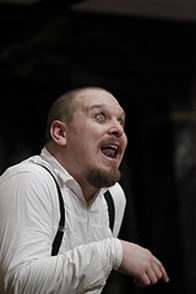A Conversation with King Richard III and Queen Margaret
[Return to previous page]
Antony Sher complained about how Shakespeare has you start off with one of his most famous speeches, “Now is the winter of our discontent.” And, of course, that's the one that everybody remembers. How do you weigh the two? Or can you weigh the two? Do you think the last one is really the gem in this?
BEN: Mmmmm. There's so many jewels in that crown. But I think the last speech is significant because it's his last chance to talk to the audience. He does the battle oration, but even the stage direction says he's talking to his soldiers, not to the audience that he started talking to at the beginning of the play.
SARAH: In the second half, he talks so much less to the audience than he does in the first half, too.

Benjamin Curns as Richard in Henry VI, Part Three. Photo by Tommy Thompson, American Shakespeare Center.
BEN: And there's little snippets in there where he's telling us he's done some awful things. It's like “the sons of Edward sleep in Abraham's bosom,” and “Anne my wife has bid this world good night.” And what's great with the lights on the audience is, you see the people turning on you. We did Richard yesterday afternoon, and I grab Elizabeth and I kiss her on the mouth and toss her out the door, and these three guys sitting on the stools go “Oh!” they shook their heads and looked down at the ground and wouldn't even look at me anymore.
SARAH: And these were the same guys who had been “Yeah, Richard!” [she claps her hands]. We get the audience complicit in clapping for him and “Yeah, take the throne!” At the beginning they're laughing at him and “Yeah, isn't that great?!” and “No, I've never seen any woman woo'd like that.” And then by the end of it they're just disgusted. But they're all complicit. They're all complicit in it because they have enjoyed the ride just as much as the next guy.
BEN: So I think it's significant that Shakespeare says, "Here's the last thing that I want this character to tell you." And the last thing he chooses to tell you is, "In case you thought I had no conscience I was lying to you when I said I didn't have one, and I was lying to myself when I said I didn't have one. And that's the truth. And I've never lied to you. I lied to everybody else who walked on this stage, but I never lied to you. Only implicitly did I infer that I didn't have a conscience, but I'm here to tell you before we leave here tonight, I do."
And by explaining all this, you are explaining to me what I felt: This is the first time I saw this as a tragedy of Richard III.
BEN: Yeah.
You said where you felt that after doing Richard you could go back and re-do Parts Two and Three. But, turning that around, did the growth from those play a part in your exploration, your journey of Richard to use her term, in part four?
BEN: Certainly. Yeah, definitely. And certainly his relationship with the audience is affected by that. Because, after he kills Somerset he has a very brief thing that he says to the audience. And then in Henry VI Three, he has two big speeches, one after the wooing scene, one after he kills King Henry. And then in Richard III, that's all he does. I often joke that the first 35 minutes of our production is such a sprint. The first three scenes of that play are just talking. There's so much talking for me to do.
But what's great is if people saw those last two plays, I think it's really great to open the show with, “You all remember me. I told you I was going to be here. I told you what we were going to be doing here this year. And I'm glad you came here to see it. You must not have been too turned off. You wanted to see me kill all these people, didn't you?" [Laughter]
We were talking earlier about the commercial aspects of doing all four of these plays—and I'm a romantic, I feel there'd be enough enthusiasm that you could do all four and put it out there, but then I don't run a theater. At the Blackfriars, you've got a unique crowd, you've got people who come back all the time. Did you somehow feel—we've talked about how the actors have felt going year to year to year to year—do you feel a good portion of the audience went on that journey—
SARAH: Yes.
—and have you gotten any sort of feedback on that?
SARAH: Yeah, we've had school groups and other people that come every year to the Ren Season. This journey has been for them as well. They've been waiting for this for three, four years, they've seen all of the parts or at least Two, Three, and now Richard III. So, there's a good percentage of our audience who have been with us on this journey as well.
BEN: When we do talkbacks for Richard, there's almost always one or two people who are like, "It's so good to see it concluded."
SARAH: Yeah.
[To Sarah] He just talked about all the sprinting he does in the beginning, and all the scenes. You get two. Do you wish Margaret had more in this, or do you think that was just right?
SARAH: It actually feels just right to me. There's a part of me that thinks, yeah, of course I would love for her to do more and say more, but the two scenes she's in are so amazing and so powerful. And I think more of her wouldn't be Richard III. It's not called Margaret, it's called Richard III, and she comes in—
It's not called Margaret in the first three either.
SARAH: It's not, even though maybe it should be. She certainly has more to do in those. She's making more of the decisions than Henry is.
But I think it's just right, and doing it now for the amount of time I've done it, it feels right. It's a big break, too. You show up in I.3, and you don't come back until IV.4. But she tells the audience when she comes back in IV.4, "What I've been up to is watching what I told you was going to happen in I.3, that's been happening." It feels right. It actually feels right.
And being a part of this company, I get the chance to play other little roles. I get to play the prince and I get to play a gentleman and a citizen, so I get to see some of the other parts of it. This is not a heavy show for me. What I do is powerful and takes some vocal energy and effort and certainly some physical energy and effort, but I only have to do it for two scenes. I don't have to maintain like Ben does. Ben at the end of the show is shattered. I haven't done all that much. It's nothing compared to some of the other things, like Dido. But there's a reason it's called Richard III and not Margaret.
And with your old arch enemy here sitting catty-corner to you, how do you feel being the only person from Part One to be standing—supposedly; we don't see her die—
SARAH: Oh no, she's going back to France.
The only one living at the end of part four.
SARAH: And historically she dies [pauses and laughs] not because she was murdered. He's rolling his eyes, that's great. [Sarah takes on a snob's tone] I feel very proud, and I think it's very fitting that Margaret is the only one to be in every single part of this tetralogy and still alive at the end of it. Makes perfect sense to me. And Richard should have been killed off in Part Two.
Care to comment, Richard?
BEN: Makes perfect sense in the sense that if these plays describe the most chaotic years of English history, then yes, she presided over them all. [Laughter] At least she's alone. At least I was able to kill both of her lovers before this run was done.
SARAH: That's true.
BEN: That's the other funny thing about doing this tetralogy is that Greg [Gregory Jon Phelps] and I have killed each other more times. [Laughter]
SARAH: It's true.
BEN: It's so funny. He plays Suffolk who hires murderers to have Gloucester killed. Ben changes his costume into Walter Whitmore and kills Suffolk on the boat. Ben changes into Richard Gloucester and comes back in Henry VI Three, kills Greg [playing Henry VI] in the Tower. Comes back in Richard III, Greg [playing Richmond] kills me at Bosworth. Good lord.
SARAH: The joys of repertoire theater and playing multiple roles.
BEN: We should really count how many times we've killed each other.
SARAH: History. We've got history.
[To continue the interview, click here] [For a PDF of this interview, click here]



 Find additional Shakespeareances
Find additional Shakespeareances